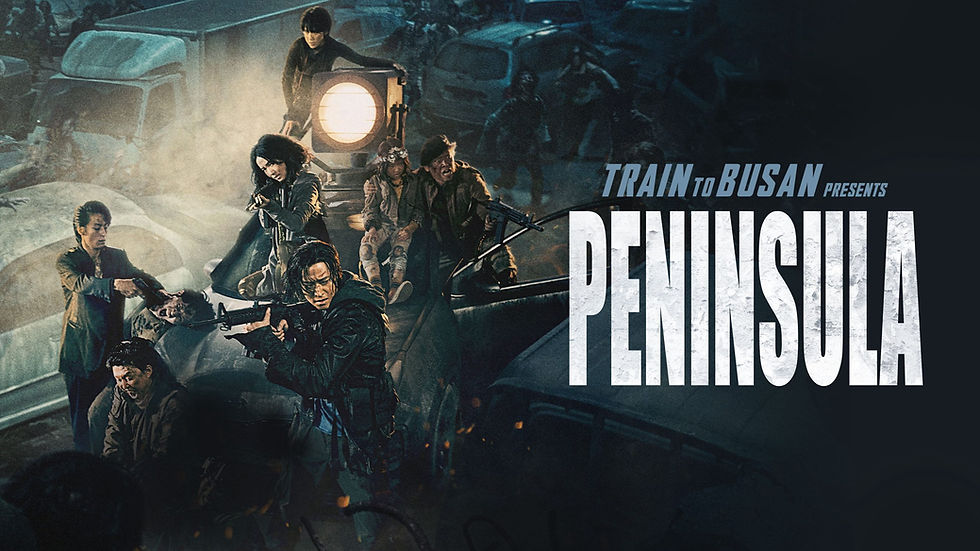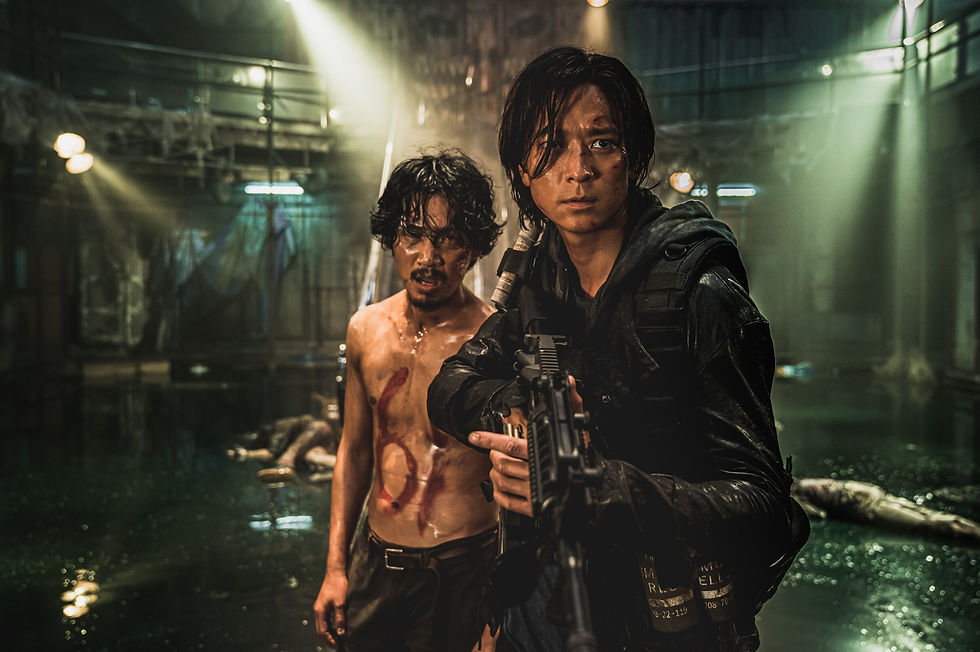Train to Busan Presents: Its Pretend Sequel, "Peninsula"
- Vega

- Jan 19, 2023
- 4 min read
Platform: Shudder
Release Date: August 12, 2020

How does one follow-up on one of the most highly acclaimed zombie films in history? By creating a sequel that is almost completely different in every way. At least, that is how Yeon Sang-ho decided to approach this action-oriented sequel to the critically praised Train to Busan. Even with a highly positive outlook towards modern zombie staples like Dawn of the Dead (2004), 21 Days/Weeks Later, and Zombieland, it may be Train to Busan that takes top billing in the genre. It was a great action-horror movie that presented zombies in a way not commonly seen. More than just being fast, which we have seen across many modern zombie movies, their body motions/movements were reflective of contortionists (complete with bone cracking sound effects). This, along with their hyper-athletic and rabid nature, opened the door for more inventive ways of presenting the zombie threat, which was especially important when the majority of the film took place in a cramped train. What really set Train to Busan apart, though, was that it delivered those survival thrills along with strong character development that not only built a strong emotional core, but also provided a well-rounded commentary on social hierarchy. Amidst all of the death and heart-racing action, the movie well-maintained its human story and allowed for a more natural connection between audience and film. While Peninsula does maintain a few elements from its predecessor, its overall presentation turns down the heart and ups the action.
This sequel takes place 4 years after the events of Train to Busan, once the Korean peninsula has been quarantined from the rest of the world, effectively left abandoned to the rule of the undead. The film follows Marine Corps Captain Jung-Seok, who lost the only family he had, other than his brother-in-law, while trying to escape on a ship when the outbreak first began. Him and his brother-in-law are recruited by a mob boss to return to the Korean peninsula and retrieve a large score of money. The trip becomes complicated when Jung-Seok and his team come across survivors, some of which have become more barbaric than others. Now, they have to survive more than just zombies to get the money back to the port where they will be picked up and safely return to Hong Kong.

Where Train to Busan used the action to supplement a deeper story, Peninsula did the opposite, relying on the drama to serve as fodder for action shockers. Peninsula is a blockbuster film, through and through, and felt very much like Fast and Furious meets 21 Days Later with shades of Mad Max: Fury Road. While all of those are fine films in their own right, Peninsula takes its action and spins it with video game rules. There are multiple driving sequences in the film, all of which throw any semblance of realism out the window. This is a movie with zombies, so it did not have to ground itself very much to be a viable plot, however, as thrilling as these sequences are, they do come off as "too much" at times. But never once did this take me out of the actions scenes, as my eyes were glued to the absolute ridiculousness. It is during these scenes that the credibility of the graphics come into question, having the feeling of a well done video game cut scene. Luckily, being set at night helps cover up the details in darkness so that the these CGI sequences do not come off as animated looking as they would have in daylight.
A major problem that Peninsula has is that it seems to forget its a zombie movie at times, with the undead serving as more of a set piece a lot of the time and take a backseat to the human antagonists and poorly crafted relationships. Similar to the criticisms The Walking Dead began to receive in its latter seasons, the zombies here served as barriers and inconveniences more so than a direct threat. It's not that this idea is bad or an inefficient way to use these creatures, but it did not appear to serve this particular movie well.

Looking at the characters, the two young sisters that Seok ends up befriending brought a lot of personality and enough cuteness to make you care about their well-being, but that is about as far as the human connection goes. There were really the highlights of this film. Other ancillary characters who, it seemed, were supposed to garner a greater level of support fall flat and are write-offs outside of their position in moving the plot forward. The strong mother, the kooky grandfather, the selfish gang leader...everyone fits their archetype and are given little else to propel their roles. Again, this was clearly written to be a blockbuster and not reach the same depth as Train to Busan. Even so, Peninsula did not completely abandon any sense of social commentary, as there are themes of refugee displacement and discrimination, as well as survivors guilt. While these themes are present, none are explored deeply enough to serve as much of a commentary and are, rather, subtle theme details.

If you were hoping to see a film that hits the emotional and thrilling levels of Train to Busan, you will have to look elsewhere. However, for mindless fun and violent driving, Peninsula is sure to deliver. I think that the director was smart to give this movie a different feel, as I did not really compare it to Train to Busan while watching the film, only helping its judgment. But, as unfair as it is, once the film is over and the adrenaline is gone, you can not help but feel disappointed that lightning did not strike twice.
RATING: 🗾 🗾 🗾 / 5
If you enjoyed this content, please follow Geeky Therapy on Facebook and Instagram to stay up to date with all posts and reviews.






Comments